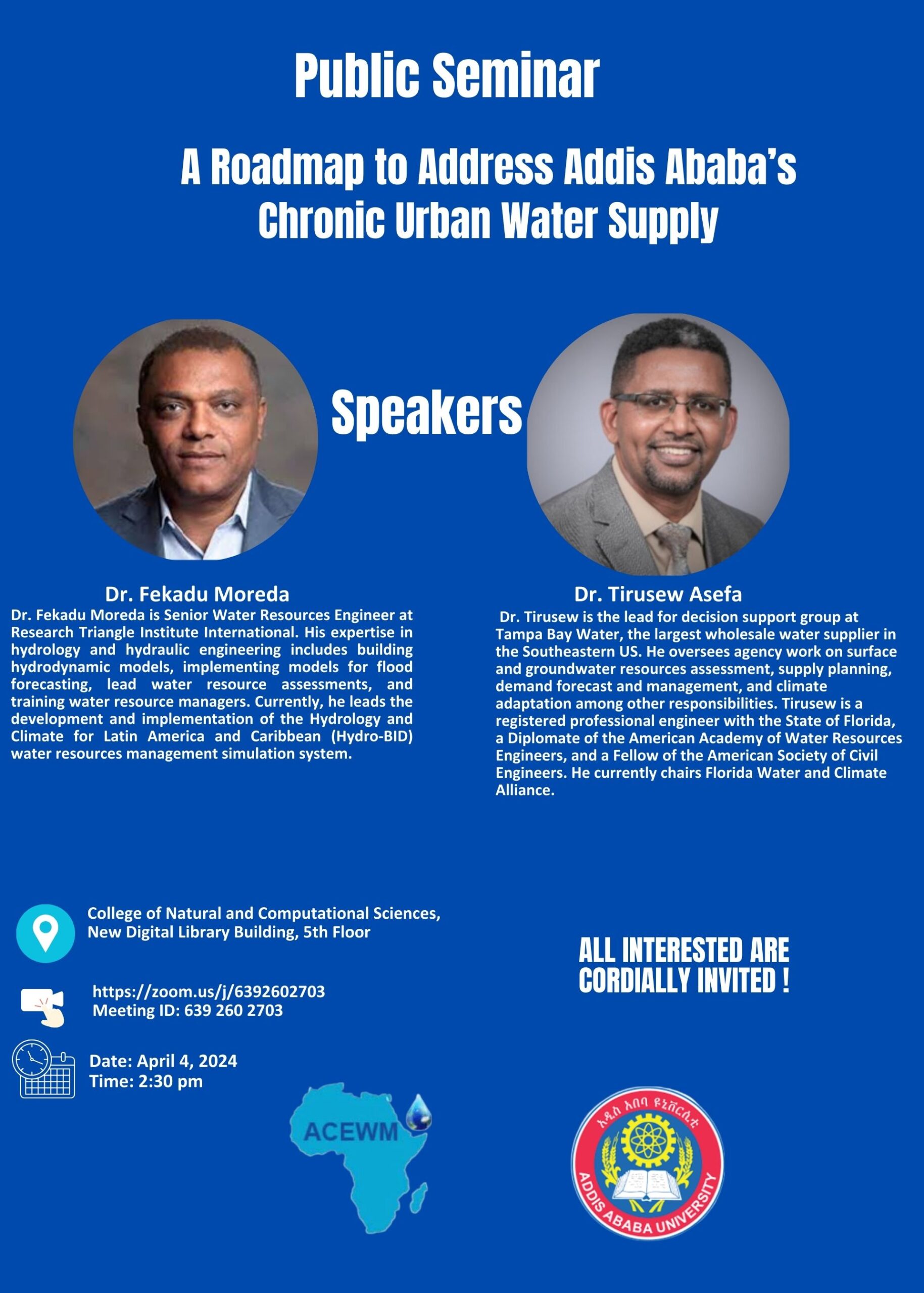
Water day celebrated with the theme “Water for Peace” by Africa center of excellence for water management in collaboration with and college of natural and computational sciences.
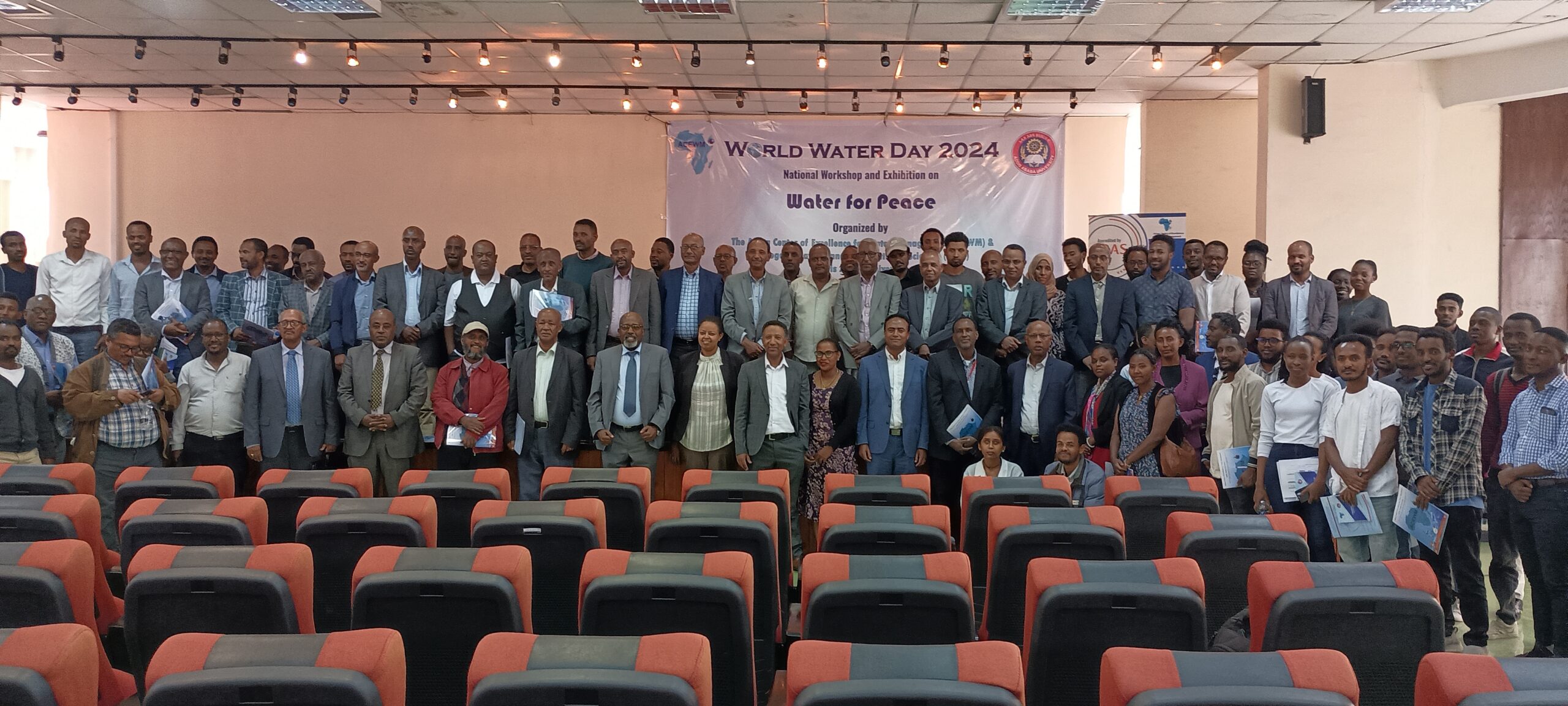
In a remarkable celebration focusing on the theme “Water for Peace,” the Africa Center of Excellence for Water Management and the College of Natural and Computational Sciences came together to celebrate World Water Day 2024. The event sought to underline the role of water as a means for peace, cooperation, and sustainable development in various communities and regions around the world. The president of Addis Ababa University, Dr Samuel Kifle delivered an opening speech through his representative Professor Tadese Fetahi emphasizing the crucial link between access to clean water, social harmony, and global stability.
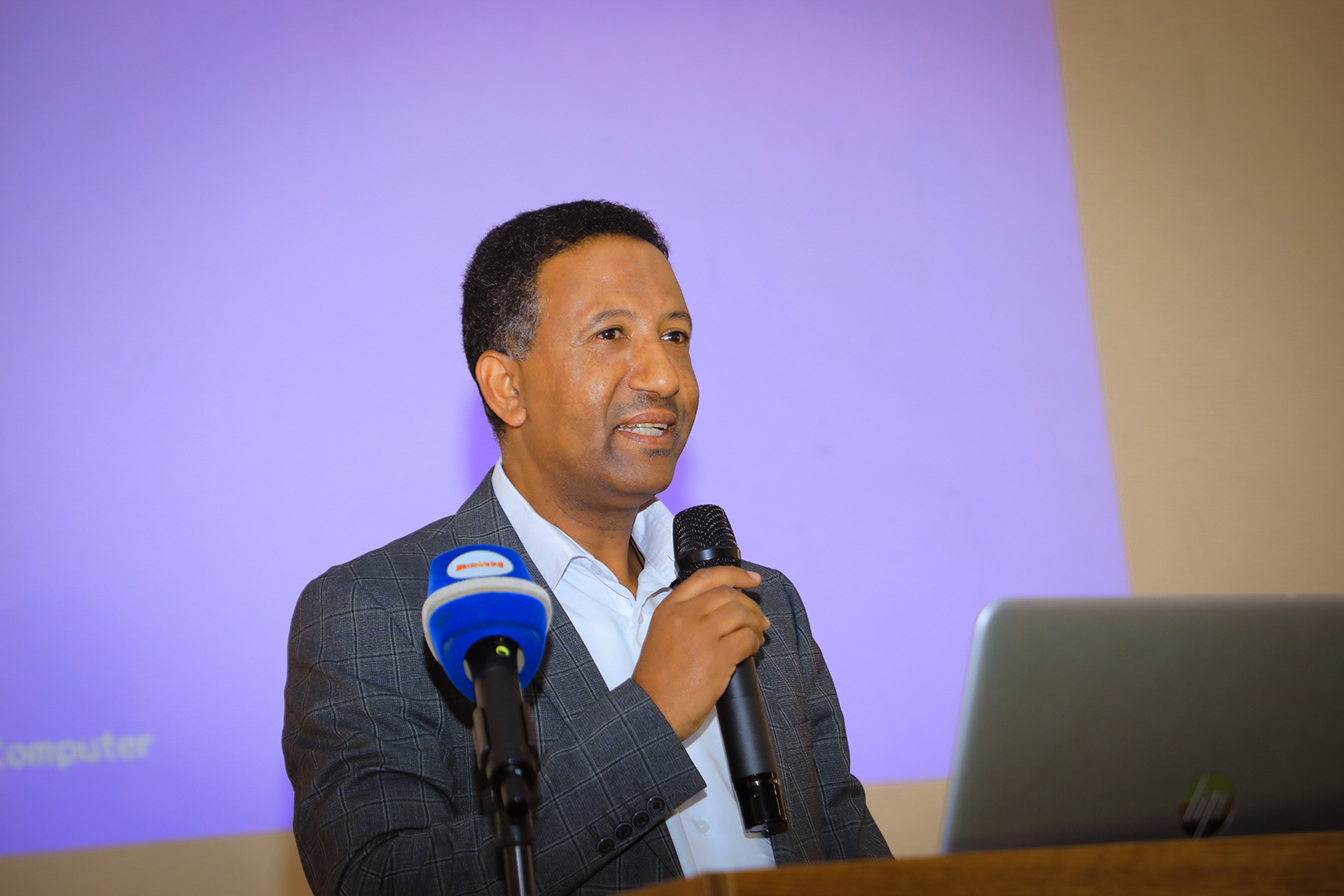
The Dean of College of Natural and Computational sciences Prof. Tileye Feyissa have also encouraged attendees to recognize water as a key factor in fostering peace and prosperity.
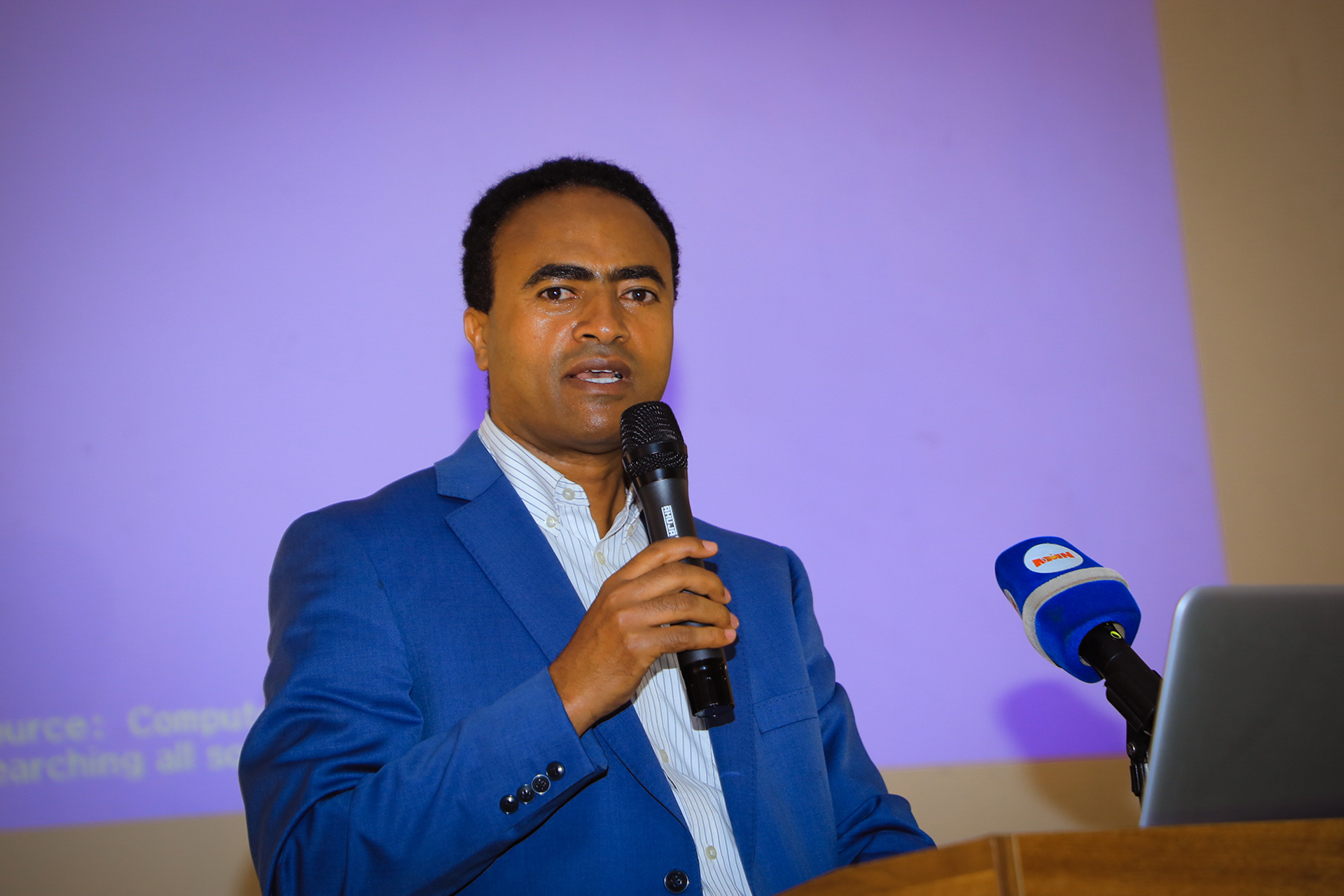
The Director of ACEWM Prof. Feleke Zewge on his part presented achievements and best Practices of the center regarding learning-teaching, research and innovation, community service, and organizational capacity development.
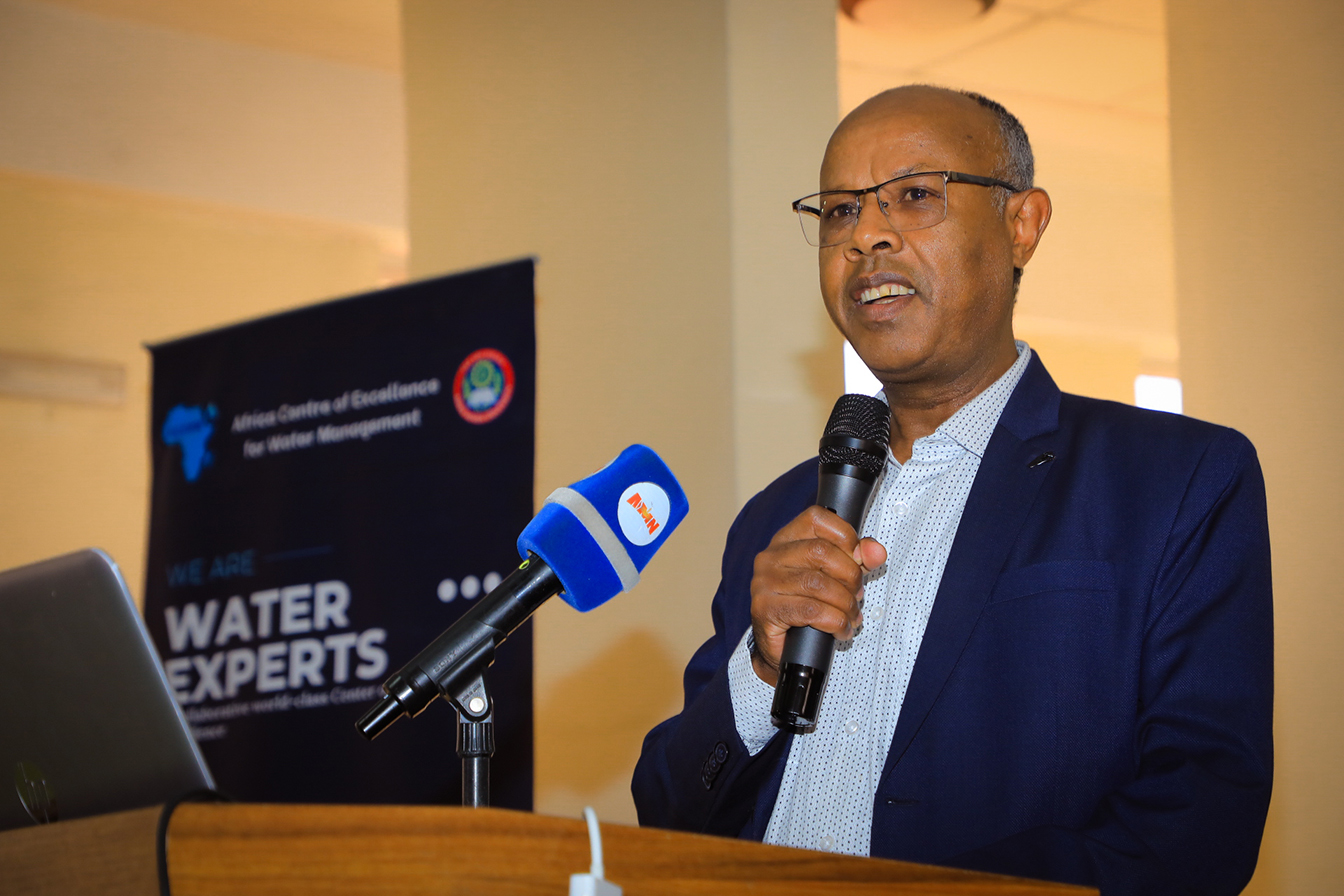
Throughout the event, participants engaged in interactive workshops, enriching discussions, and awareness-raising activities to underscore the importance of water conservation and equitable water access. Dr. Yacob Arsano, Prof. Esayas Alemayehu, Prof. Tigistu Haile, Dr. Yemane G/Selassie and Dr. Adey Feleke are among experts and scholars who shared their insights on the interconnectedness of water resources, conflict prevention, and international cooperation in addressing water-related challenges.
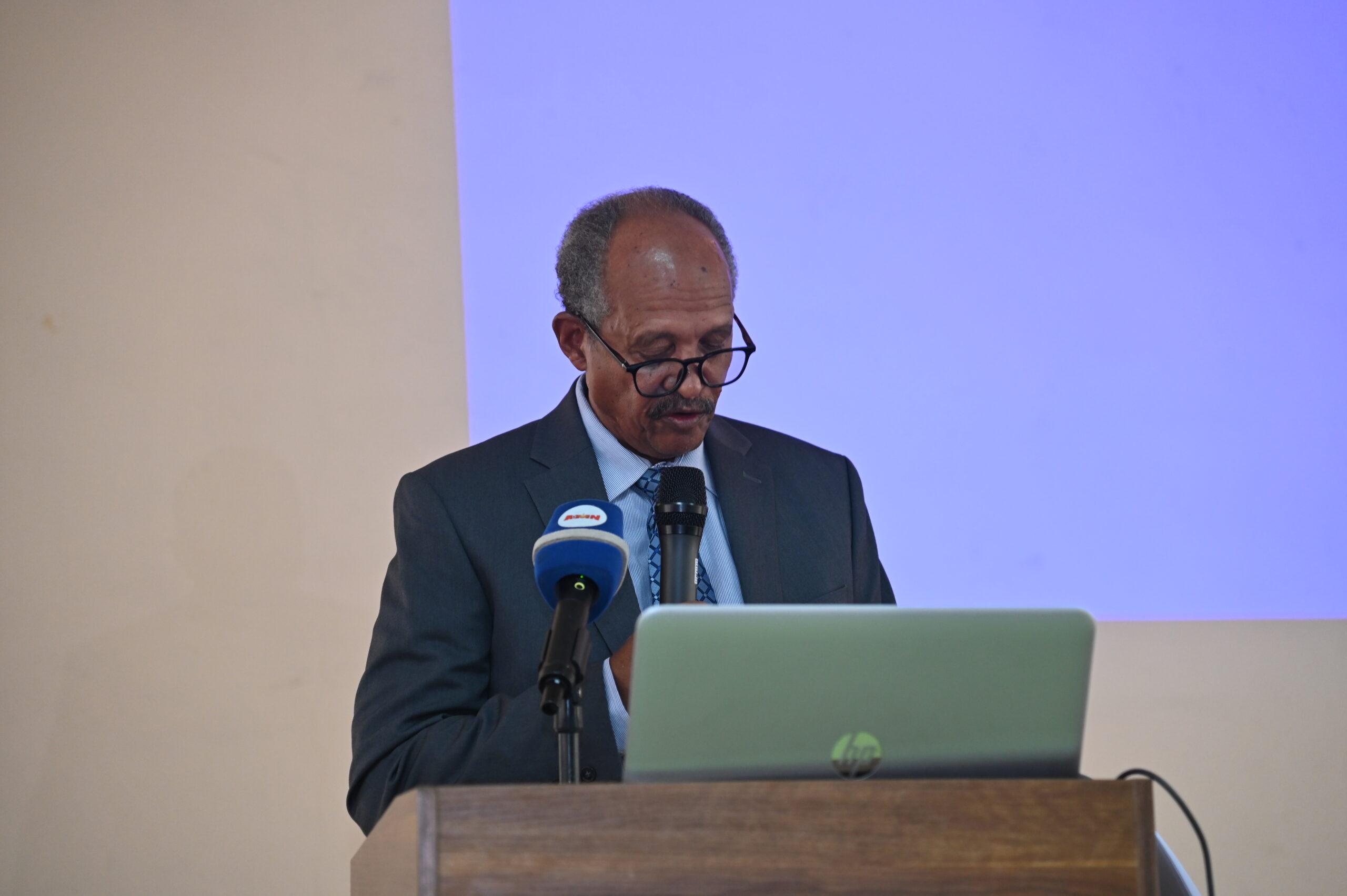
The topics of their presenatation are Water for Prosperity and Peace, Contribution of Science and Technology for Sustainable Water Management in the Nile Basin, Improving Water Supply in Schools, and Managing Textile Wastewater in the Ethiopian Context: Challenges and Opportunities and; Resource Recovery and Water Reclamation from Municipal Wastewater respectively.
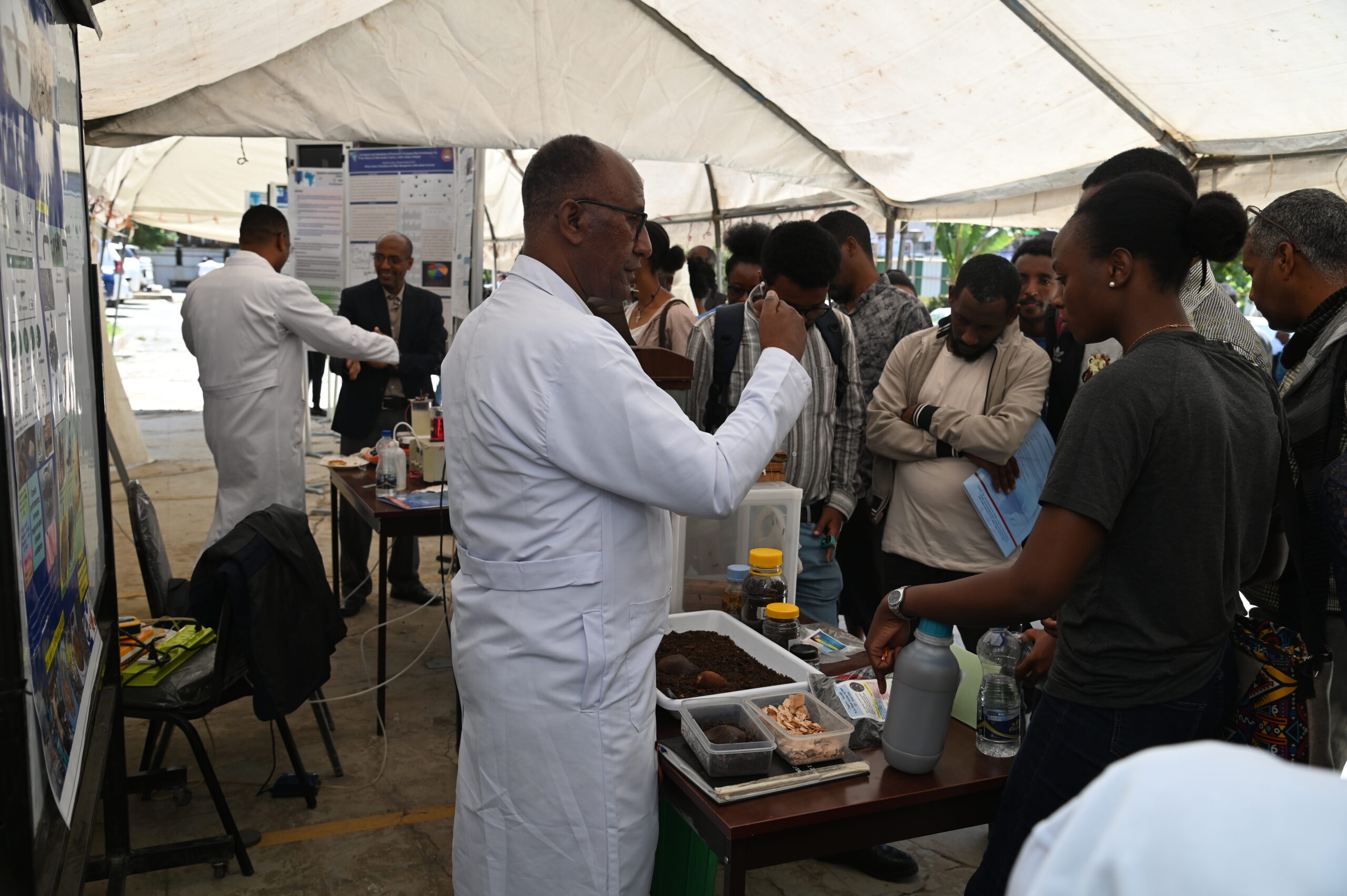
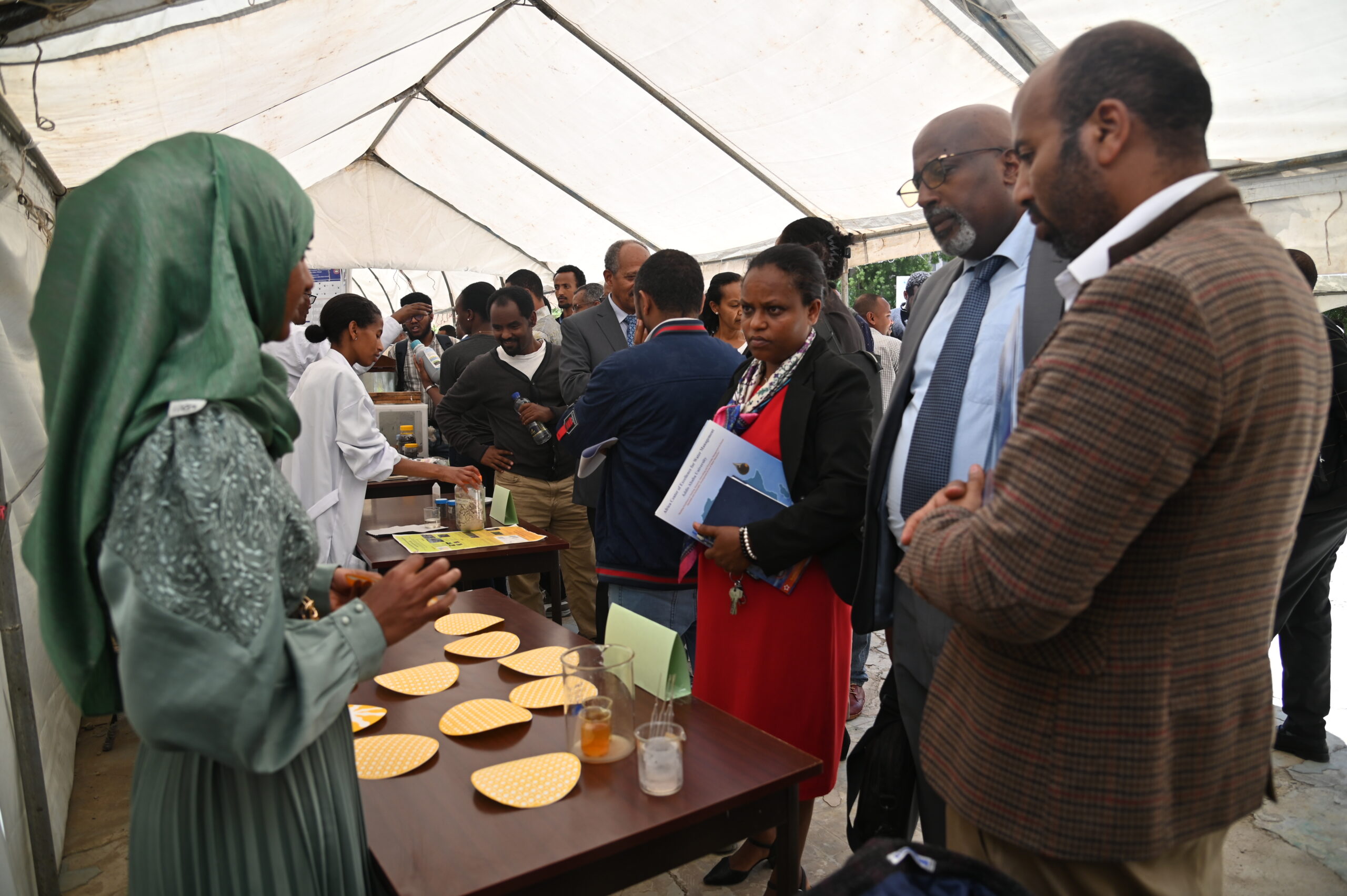
Five PhD candidates namely Birtukan Abebe, Gilbert Chifundo, Mathewos Hailu, Wondimu Kebede, Thandile Gule have also presented promising findings regarding water Science and technology. The topics of their presentation are Water-Footprint Accounting for Water-Intensive Products: Case study in the Upper Awash River Basin, Ethiopia, A Novel Wastewater Treatment Prototype for Heavy Metal Removal, The Impact of Micro plastics in the Aquatic Environment in the Ethiopian Rift Valley Lakes and Reservoirs, and Removal of Pharmaceuticals from Wastewater with Coupled Adsorption/Electrochemical Oxidation Process and Sustainable Water Resources Management for Addis Ababa City respectively.
Technology and Laboratory Exhibition and Demonstration have also been part of this year’s water day celebration.
The cooperation between the ACEWM and the College of Natural and Computational Sciences in organizing Water Day underscores their pledge to move ahead research, education, and outreach initiatives in the area of water sciences. By championing the theme of “Water for Peace,” the event give emphasis to the transformative power of water in building bridges, nurturing dialogue, and encouraging a more peaceful and sustainable world for all.
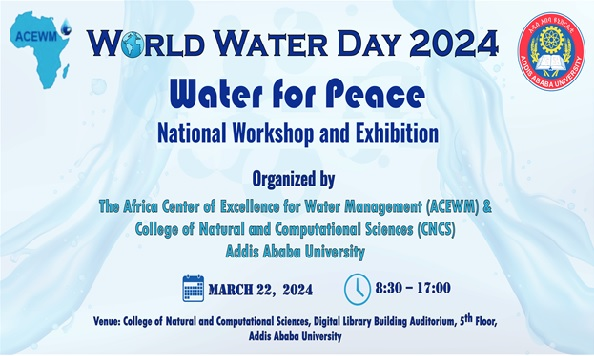
The Africa Centre of Excellence for Management (ACEWM) was established to address the need to develop highly skilled human resource capable of handling more complex water management problems in a holistic, integrative and transformative approach.
Click the below link to apply for the training.
The title of Dr Adem’s dissertation is “Water Quality Characteristics, Trophic Status and Aquatic Communities in Response to Water Level Fluctuation in Lake Ardibo, Ethiopia”. In Lake Ardibo which was found in a mesotrophic state Dr Adem identified 66 species of phytoplankton, grouped in 7 phyla, including Bacillariophyta (23 taxa), Chlorophyta (21 taxa), Cyanophyta (14 taxa), Euglenophyta (3 taxa), Charophyta (2 taxa), Dinophyta (2 taxa) and Cryptophyta (1 taxon).
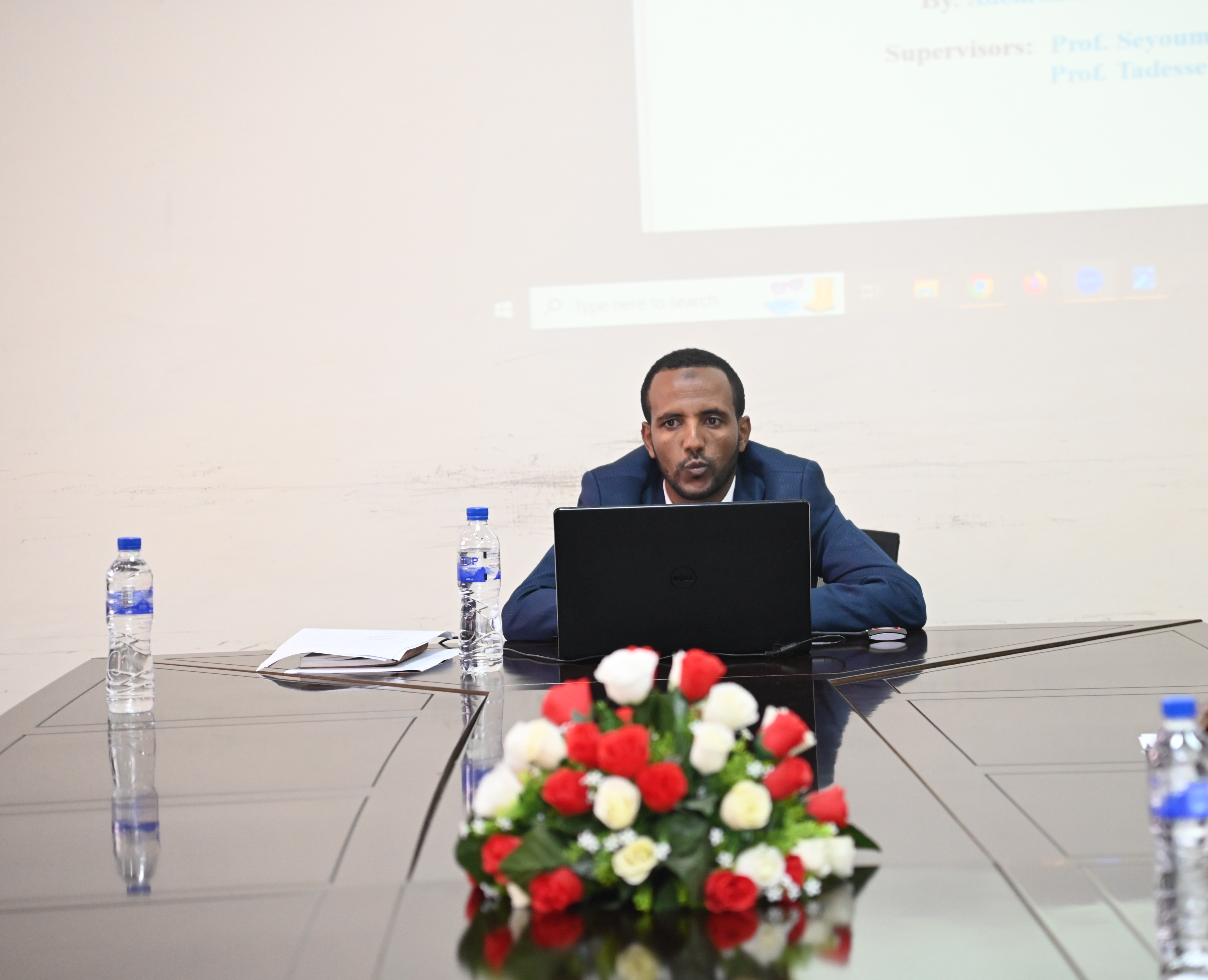
Key findings from the study include Temporal rather than abiotic factors far influenced phytoplankton dynamics. 33 species of zooplankton have been recorded, including rotifers (18 species), cladocerans (11 species), and cyclopoid copepods (4 species). Zooplankton abundance varied significantly by season, with peak abundance (4232.13 ind. L −1 ) in the dry season and lowest abundance (402.42 ind. L −1) during the long rainy period. 20 Macrophyte species belonging to 13 families were identified.
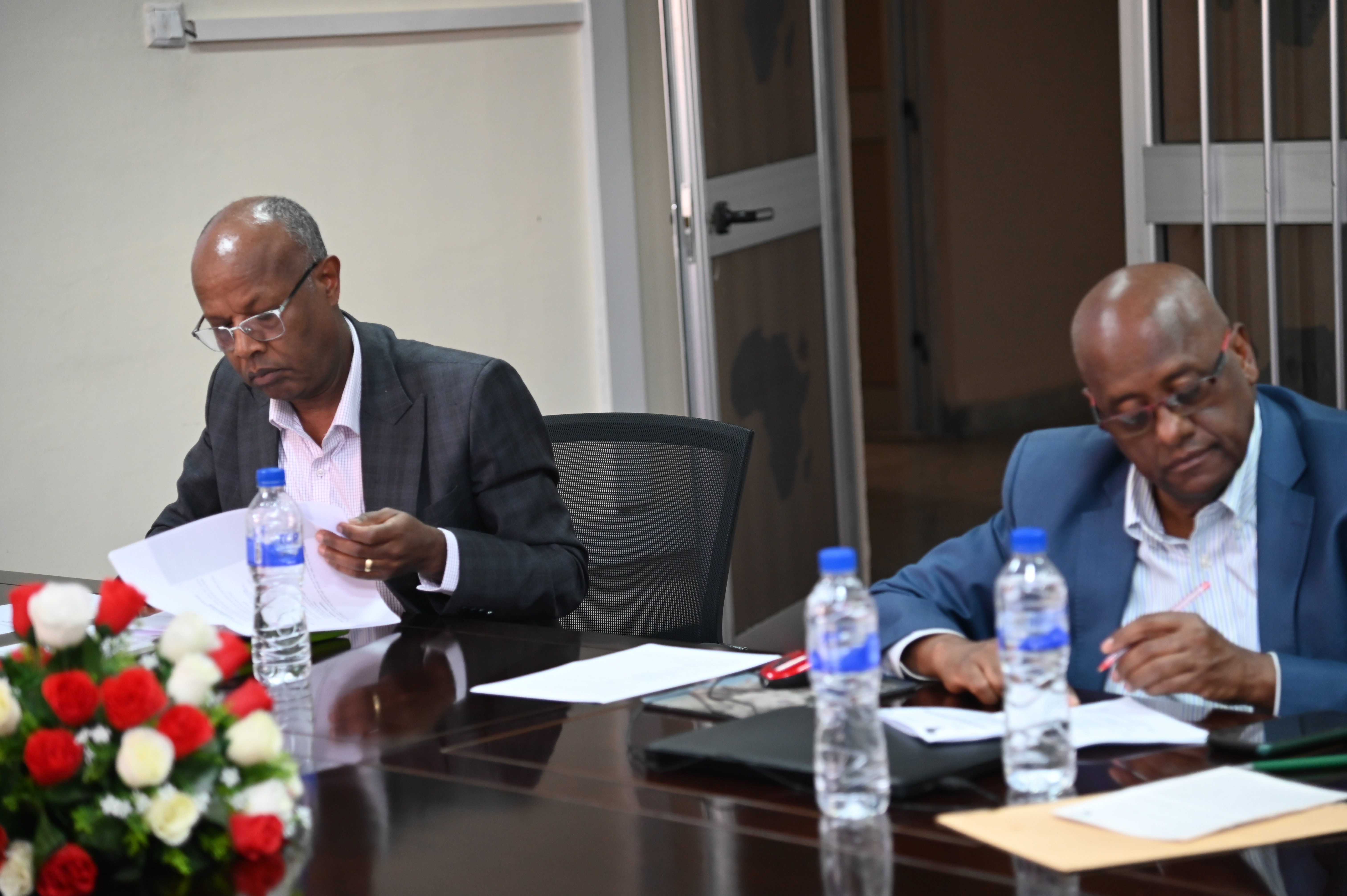
Dr Adem’s Study also indicated Cyperaceae reached the highest relative frequency (42.214%), followed by Ceratophyllaceae (17.623%) and Potamogetonaceae (13.525%). The abundance of floating leaf species increased during the high water level period, while the abundance of submerged macrophytes increased during the low water level phase.
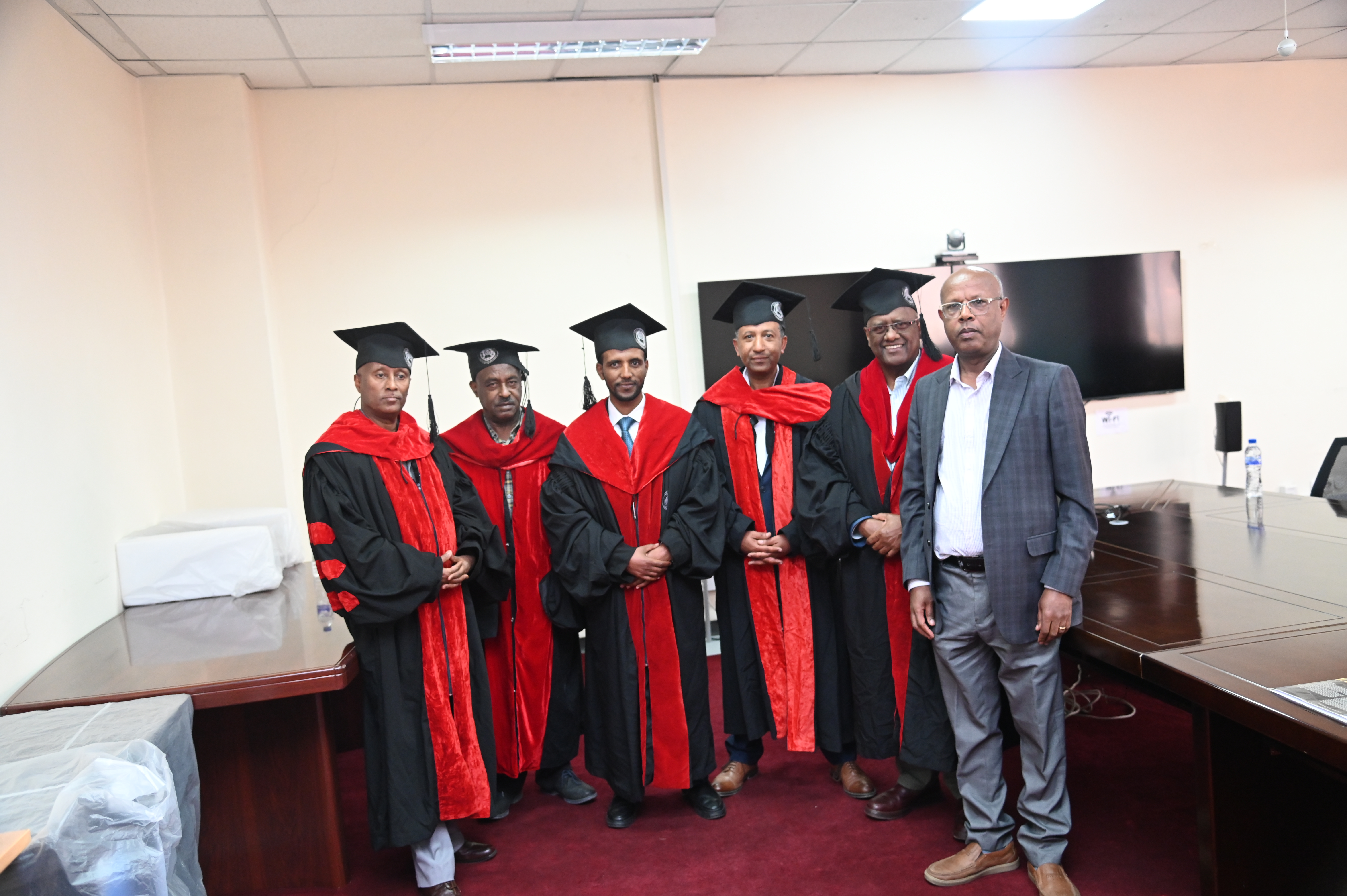
The board of examiners which evaluated Dr. Adem’s Dissertation consisted of the chairperson Prof. Feleke Zewge , Director of ACEWM, his internal examiner, Dr. Demeke Kifle of Addis Ababa University and his external examiner, Prof. Zinabu Gebremariam of Hawassa University. The dissertation was mainly supervised by Prof. Seyoum Mengistou and Co supervised by Prof.Tadesse Fetahi both from Addis Ababa University.
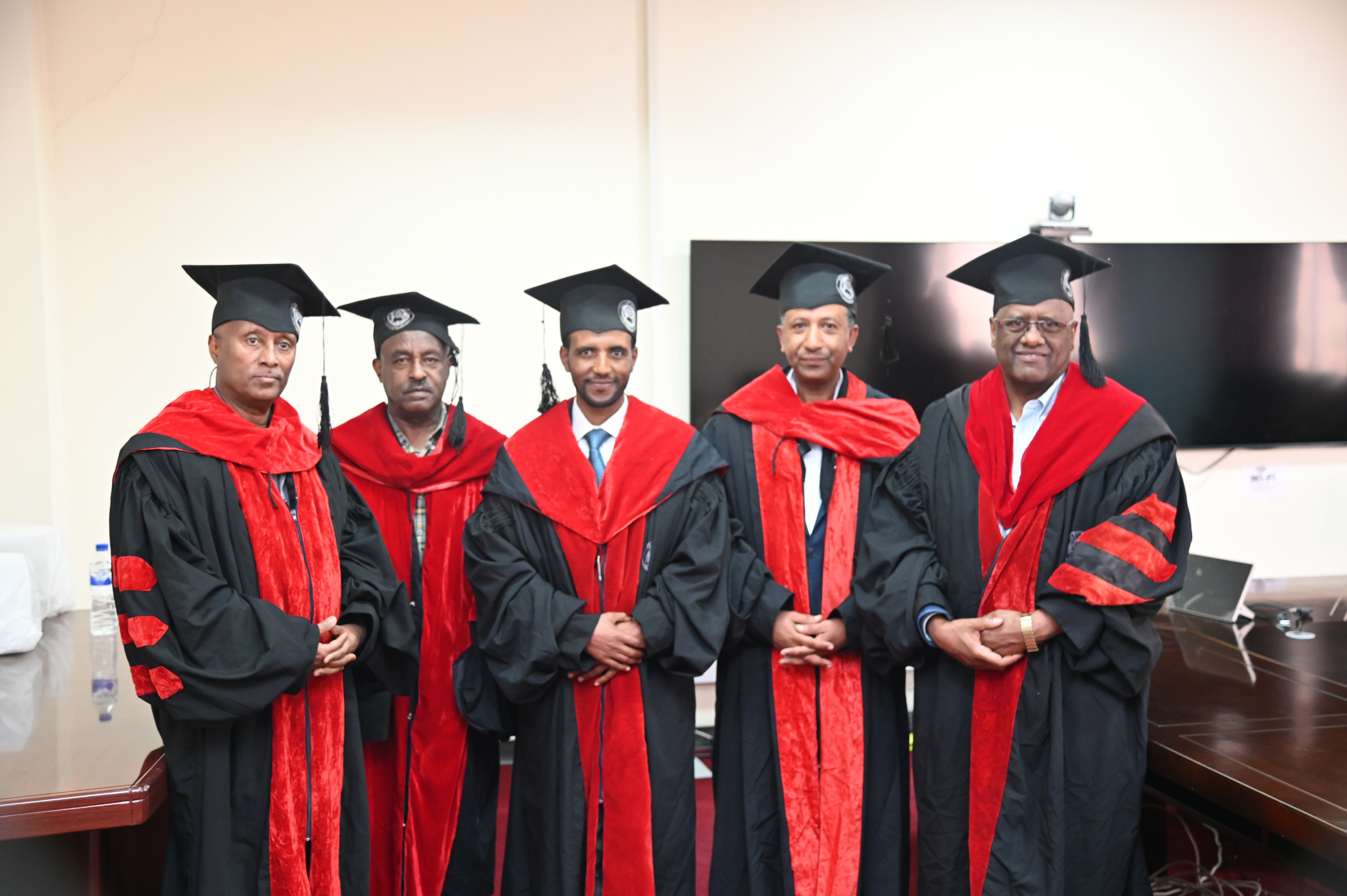
Speaking after his successful defense, Dr. Adem expressed his gratitude for the support and guidance received throughout his doctoral journey. He emphasized the importance of collaborative, interdisciplinary research in addressing the complex water management challenges, and reaffirmed his commitment to contributing to sustainable environmental management and conservation efforts in Ethiopia and beyond.
The Director of Africa Center of Excellence for Water Management, Prof. Feleke Zewge recently made a momentous visit to Hohai University in Nanjing, China. This visit marks an essential moment in the partnership between the two academic institutions and highlights the growing importance of international cooperation in tackling global water and environmental challenges.
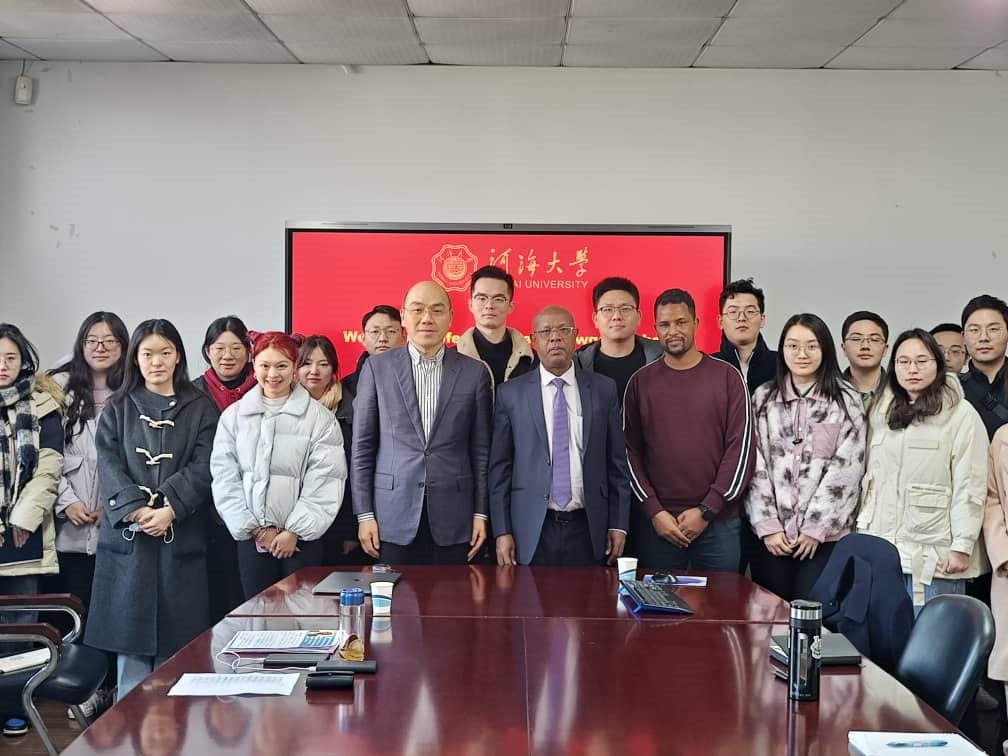
Hohai University which got its name from mandarin word “Hohai”, literally means River and sea, is famous in the disciplines related to hydrology, water resources, hydraulic engineering, coastal engineering and marine engineering.
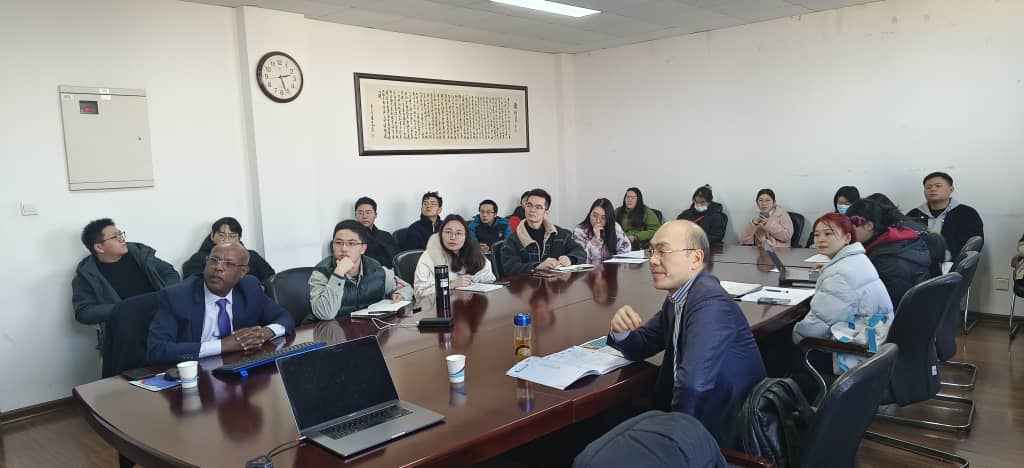
The leader of ACEWM, Prof. Feleke who is renowned expert in environmental Chemistry, during his visit engaged in fruitful deliberations with faculty members and researchers at Hohai University, sharing precious insights and expertise in the field of water education and research. The exchange of knowledge and ideas between these two well-regarded institutions holds promising potential for innovative advancement in addressing pressing environmental issues, especially in the realm of water resource management and sustainability.
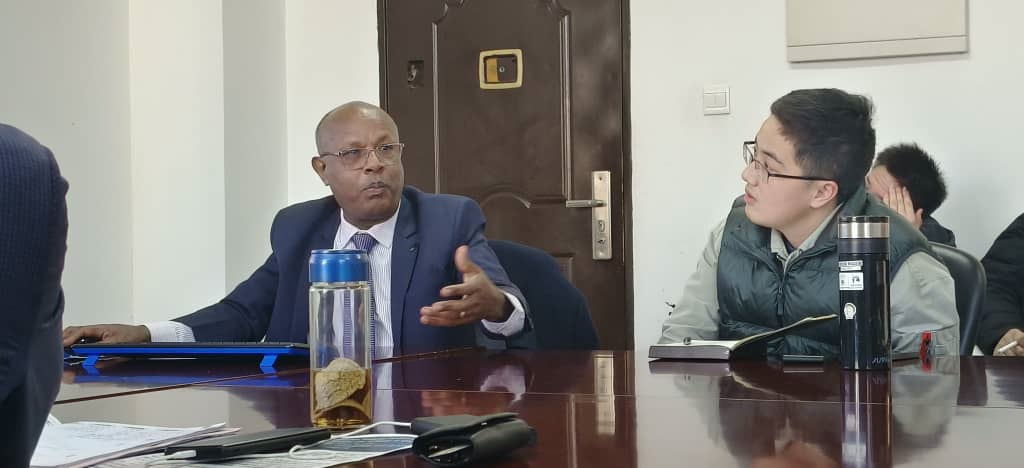
On the discussion with Hohai University representatives Prof. Feleke explained 11 Potential collaboration areas namely Water purification, monitoring and restoration of lakes and reservoirs, environmental biotechnology, urban water management, water quality, decentralized waste water treatment, water harvesting, climate change, water conservation ,sanitation, and water governance. Hohai University showed strong interest to jointly develop international projects for possible funding by the Chinese Government.
In addition to fostering academic partnership, Professor Feleke Zewge’s visit provided an opportunity to reinforce cultural connections and reciprocal understanding between Ethiopia and China. His presence at Hohai University serves as a testament to the shared commitment to advancing environmental research and education on a global scale.
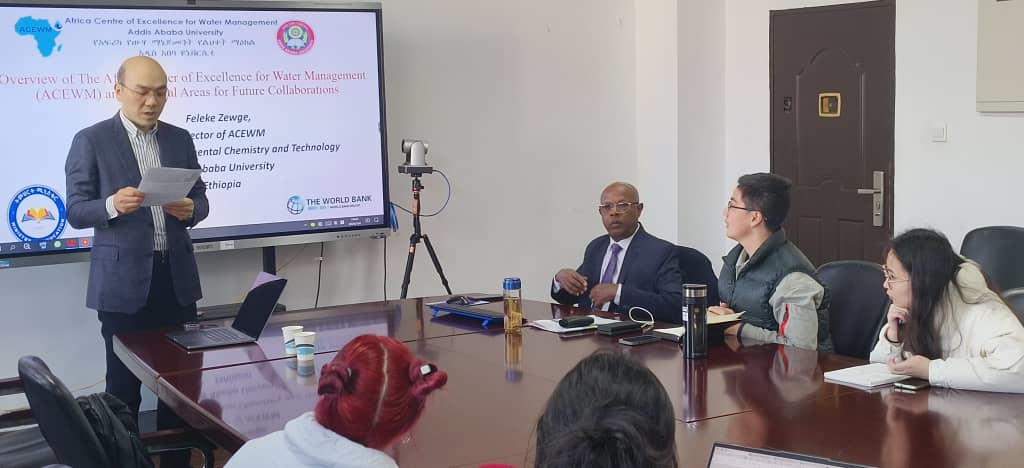
As the leader of Regional Center of Excellence Prof. Feleke Zewge continued to take part in a pivotal role in driving initiatives that promote sustainable water practices and environmental stewardship. His visit to Hohai University exemplifies the importance of such international cooperation in addressing the complex challenges facing our planet and emphasizes the potential for impactful change through cross-border collaboration.
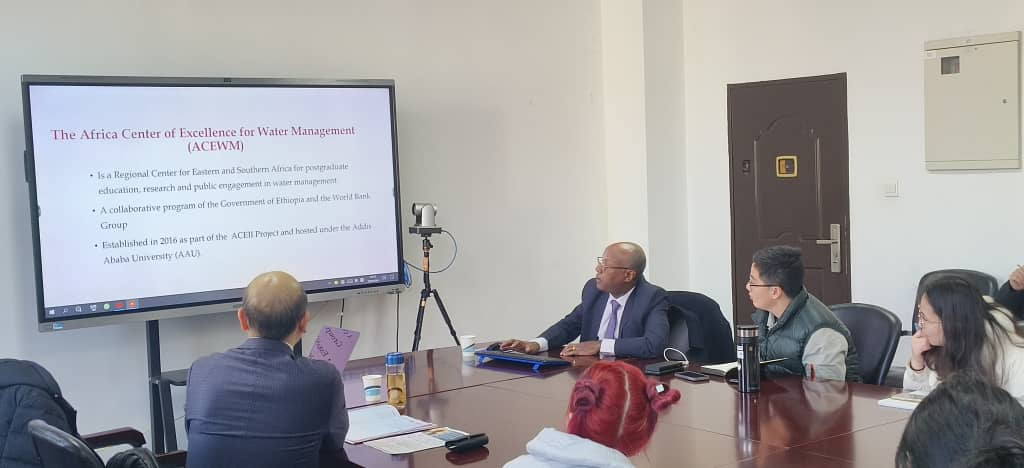
The promising outcomes of Professor Feleke Zewge’s visit are sure to resonate within the academic and environmental communities, as the cooperation between Addis Ababa University and Hohai University lay concrete on the way for prospective endeavors in pressing on water education and research on an international level.
French national successfully defended his PhD dissertation at ACEWM on December 19, 2023. Dr Stanislas’s research topic is entitled “Efficacy of Pesticide Removal in Vertical-Flow Constructed Wetlands for Application in the Floriculture Industry”. His work contributed to a better understanding of pesticide dynamics under various operating conditions for the vertical flow CW, and demonstrated that modeling is a practical tool to assess and predict the performance of the CW with detailed spatial and temporal information.

The developed model, in contrast to black-box models, considers the key physicochemical processes behind pesticide removal in the CW, including a hydraulic model to account for the varying water saturation. The model was tested on the pilot-scale vertical flow CW, and simulated the fate of two different pesticides.
Due to the nature of mechanistic model, the developed model is readily configurable using existing chemical property values that can be retrieved from the literature, and will become a versatile tool in terms of the applicability to other pesticides.
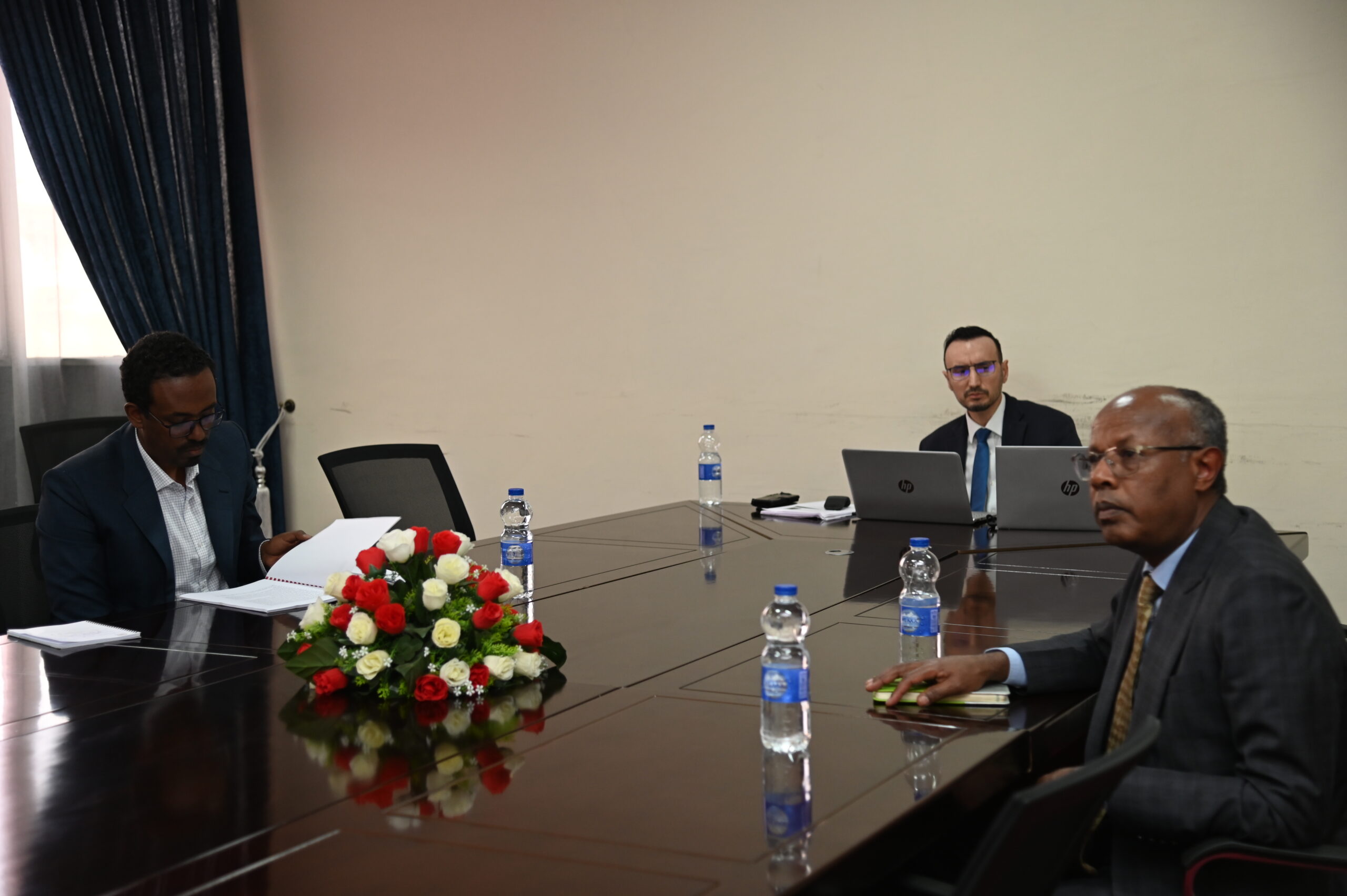
Dr. Stanislas not only immersed himself in the rich Ethiopian culture but also displayed an extraordinary cultural integration; where he and his French wife gave their two kids Ethiopian names called Eden and Zekarias.
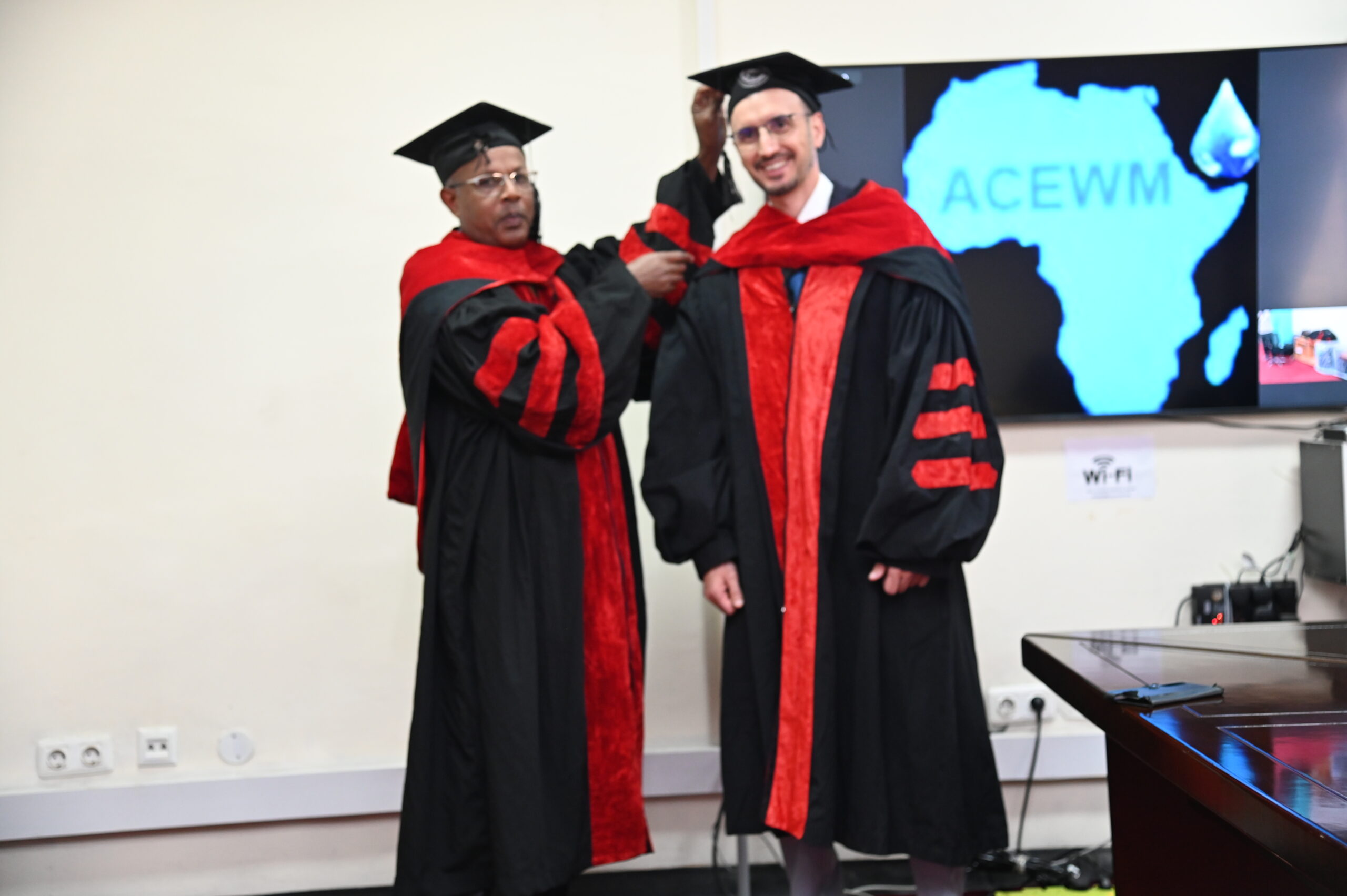
His supervisor Prof. Feleke Zewge said throughout his studies, Stanislas’s Amharic fluency became a key asset in his interactions enabling him to delve deeper into his chosen field of study and engage in meaningful discussions.
The day of Stanislas’s dissertation defense was a significant circumstance, filled with a sense of pride and achievement. As he stood before the esteemed panel of examiners, consisting of the Chairperson Dr. Beteley Tekola, Deputy Director of ACEWM, his internal examiner Prof., Dr.-Ing Esayas Alemayehu of Jimma University and his external examiner, Prof. Nigus Gabbiye of Bahir Dar University, he presented his research with confidence and fluency in Amharic, impressing all those in attendance.
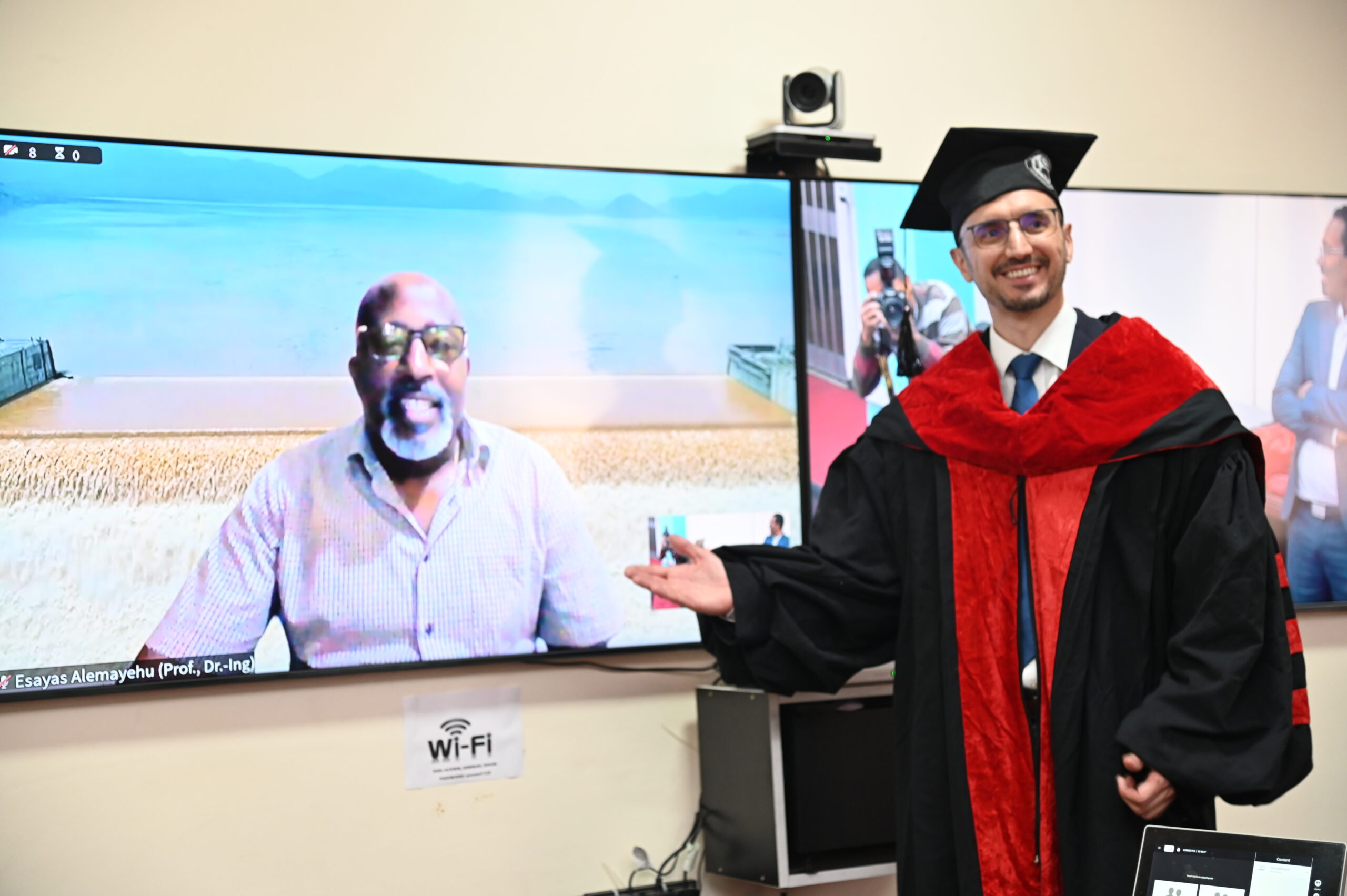
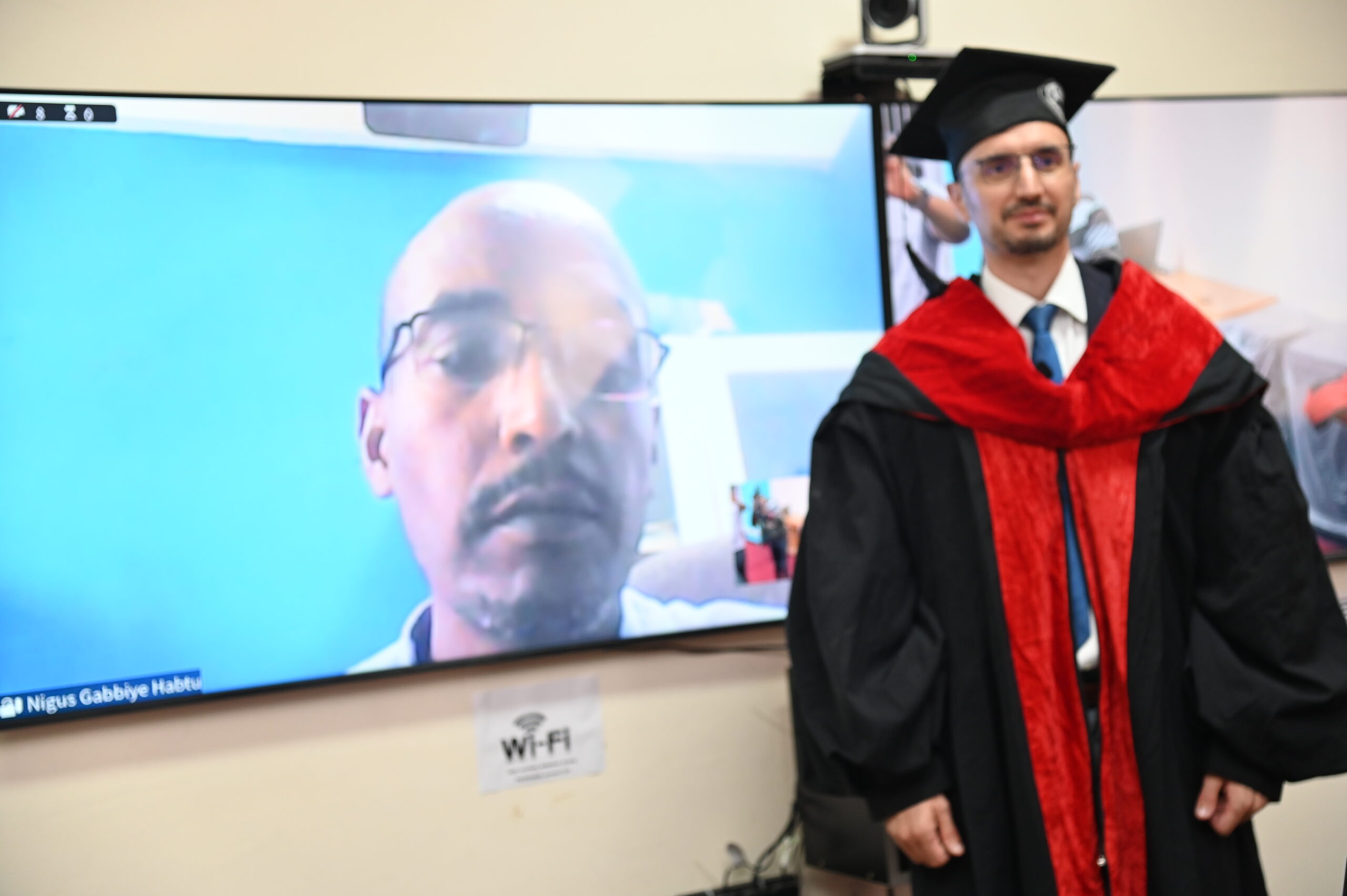
Prof. Feleke Zewge, the Director of ACEWM is the main supervisor of Dr stanisles’s Dissertation where as Dr. Yoshihiko Inagaki from Waseda University, Tokyo, Japan is Co supervisor.
Prof. Feleke Zewge said Dr. Stanisles’s story serves as an inspiration to all who face barriers of language, cultural differences, and distance. He further stated ACEWM will continue being Regional Center of Excellence by producing international water experts.
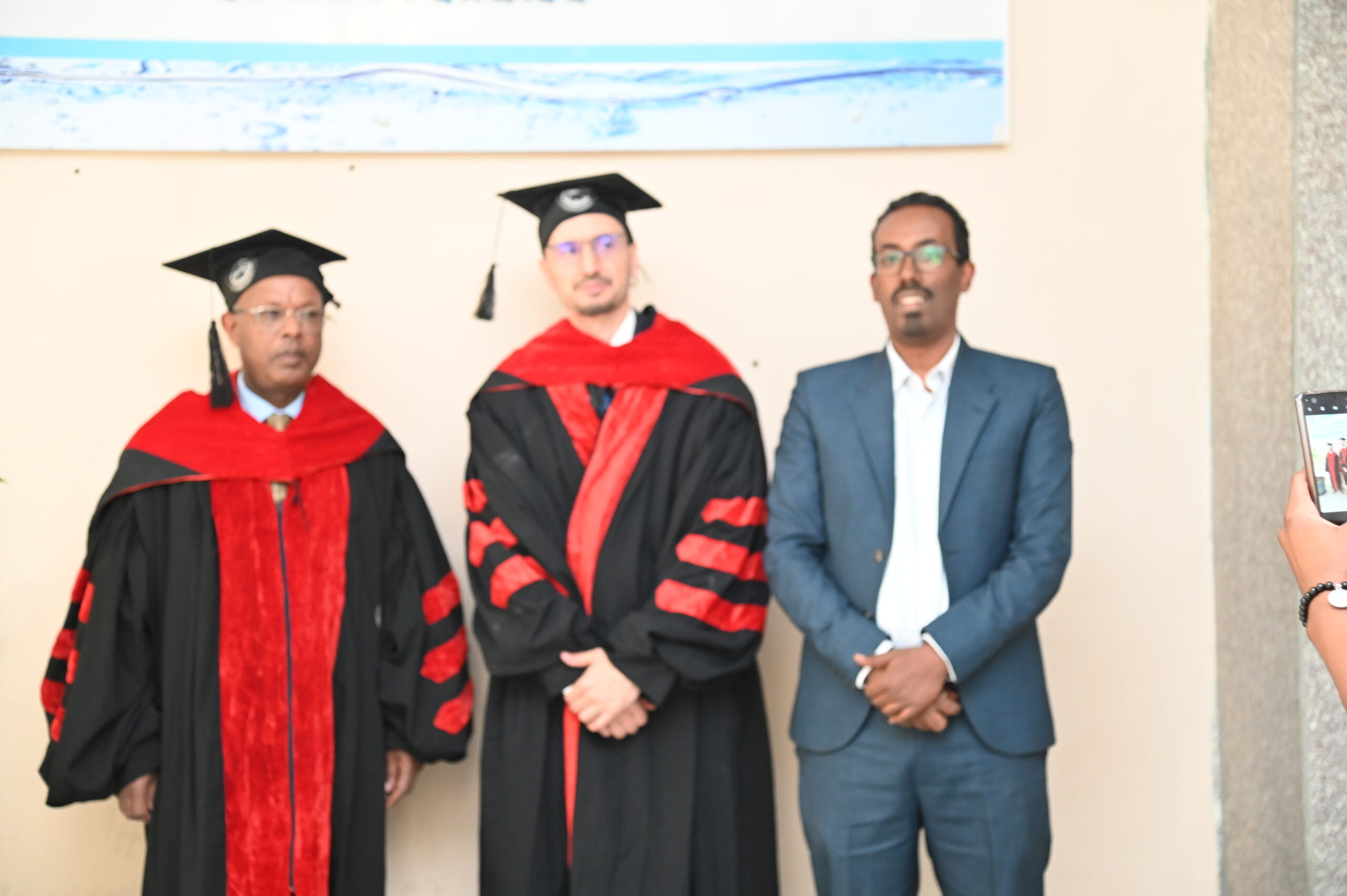
As Dr stanislas go a head in his professional journey, armed with his PhD in hand and his fluency in Amharic, he expressed his readiness to contribute to the international discourse on water science and technology.
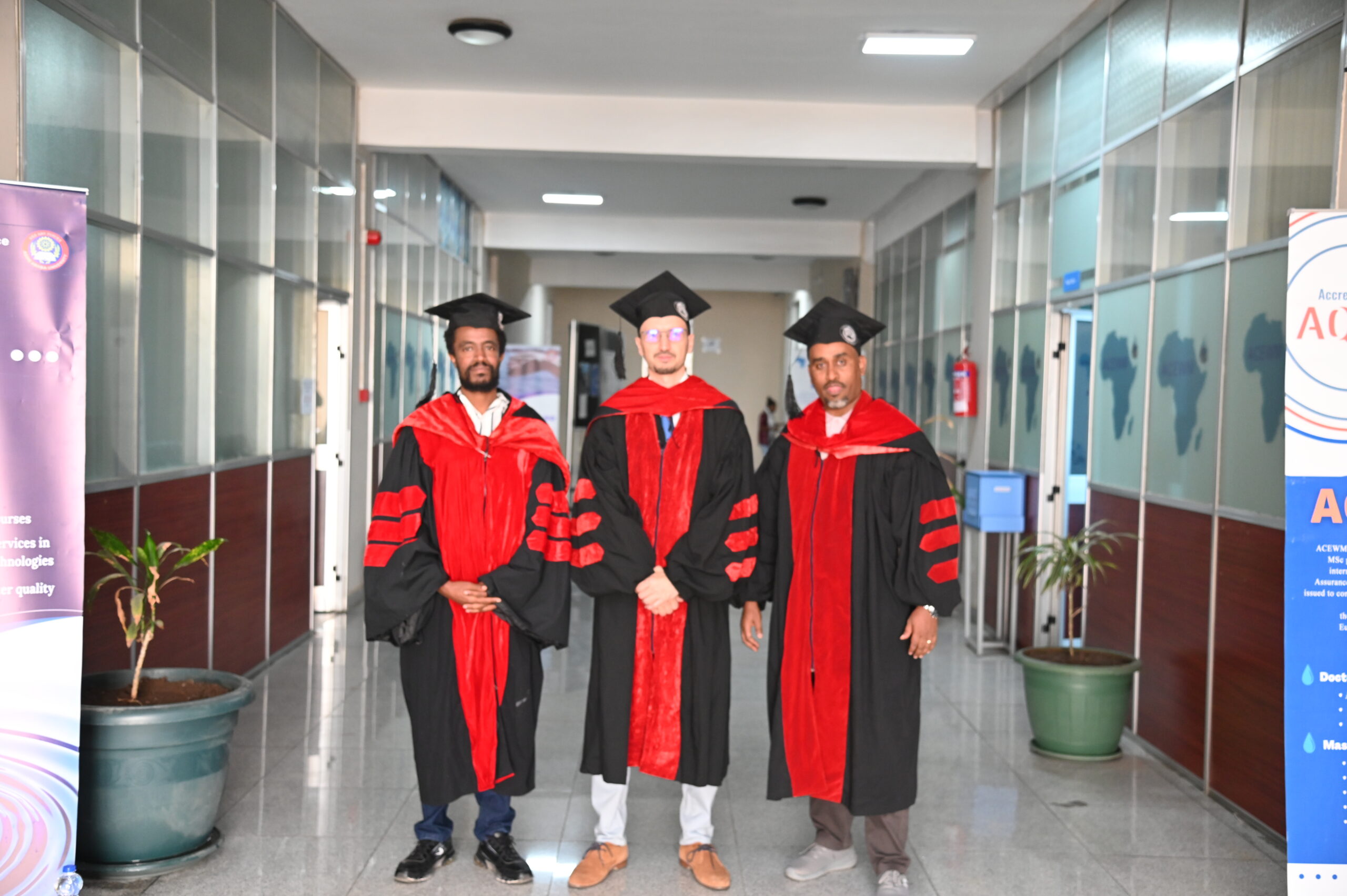
THE STATUS OF AUTONOMY WILL ENABLE ETHIOPIA’S OLDEST UNIVERSITY TO FULLY FOCUS ON EDUCATION AND RESEARCH
The Interim President of Addis Ababa University, Dr. Samuel Kifle has said the milestone pronouncement by the Council of Ministers which granted the status of autonomy to Addis Ababa University will make Ethiopia’s oldest University free from political pressure with full focus on education and research.
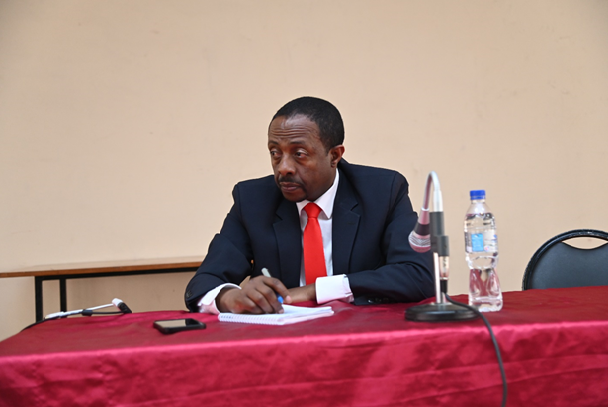
The academic and administrative staffs of the College of Natural and Computational Sciences have held discussions with interim leadership of the University on the agenda of finalizing the process of the University’s Autonomy.
The interim President, who mentioned the fact that lack of academic freedom has been a problem that many intellectuals in the country have complained about, asserted AAU is projected to serve as an example for other publicly owned Higher Education Institutions.
The University’s Administration and Student Service Vice President Dr. Abdurezak Mohammed on his part stated the preparation of 12 reform documents are among the key transitional works being undertaken on the way to the University’s full autonomy.

On the discussions held at Arat Kilo Campus, top Management of the College which include Prof.Tileye Feyissa, the Dean of College of Natural and Computational Sciences and Prof. Feleke Zewge, The Director of Africa Center of Excellence for Water Management have presented the overall performance and future directions of their work areas mentioning their adherence to collaborate with the interim leadership.


The College’s staff members had expressed their pleasure on the Autonomous honor conferred to the University; forwarded different suggestions on the meeting and discussions were made with the interim Leadership.

Dr. Samuel has said the interim leadership is working to finalize the process of autonomy with ultimate vigilance not to make any fault in the journey but also with appreciable speed not be late.
The interim leadership of the AAU headed by the President Dr Samuel Kifle, has also paid a brief visit to ACEWM’s facility, an Internationally Accredited Regional Center of Excellence.

The Autonomous status of Addis Ababa University was declared by the law passed on 4 August by the Federal Democratic Republic of Ethiopia’s Council of Ministers.
ACEWM HAS FINALIZED ITS FIRST GRADUATE TRACER STUDY (GTS)
The Africa Center of Excellence for Water Management (ACEWM) put the quality and relevance of its educational programs as its utmost priority since its commencement of actual academic operations in the 2017/18 academic year.
in order to evaluate program effectiveness, improve curricula and support services, enhance graduate employability, strengthen industry partnerships, engage alumni, and maintain institutional accountability; it is essential to undertake a Graduate Tracer Study(GTS).By tracking the career outcomes and experiences of graduates, the Center is aiming to make data-driven decisions to align its programs with water and other sector needs, prepare students for the job market, and ensure educational programs remain relevant and valuable.
To this end, GTS has been conducted for both Master’s and PhD graduates in the various specialization tracks of the Center. As the ACEWM is a relatively new Center, the total number of graduates, who have completed their studies, is limited. Accordingly, the graduate tracer study covers all graduates from the Center and students who have successfully completed all the requirements of the AAU and the Center for completion of their studies. A non linear platform has been used through a well-designed questionnaire to be completed by all graduates. The survey targets all MSc and PhD graduates of ACEWM from 2018/19.It considered a5% margin of error and an 80 percent minimum response rate. The online survey was sent to all graduates via their email addresses. The total number of potential respondents for whom the survey instrument is sent for are the 12 PhD and 68 MSc graduates of the center by the time of the survey. From these, a total of 66 responses were collected accounting for 55 MSc and 10 PhD graduates which correspond to 82.5 percent response rate.
The survey instrument has been designed to align with the Center’s objective to further strengthen the quality and relevance of its programs.
In general, the study revealed that ACEWM is equipping graduates to the level required and aspired by students. Moreover, the tracer study highlighted the need for more resources in line with accommodation, recreational and medical facilities. The finding also indicated the need for future refresher specialized short courses to continuously upgrade skills of graduates relevant to the demand of their work area.
For more information, please visit our website link https://acewm-aau.org/research-documents
Call for Application for Admission PhD Program in One Health for 2023/24 Academic Year
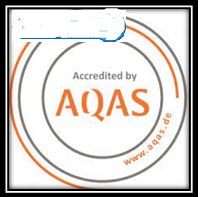
| Programs | Tracks | Academic Requirements |
| PhD |
One Health |
Master of Science Degree (MSc) or equivalent in any of the Health Sciences, Veterinary Medicine, environmental sciences, water technology, urban design, housing, urban planning environmental planning construction technology, Biomedical engineering, chemical and environmental engineering, and related fields from a recognized institution. |
Duration of the Programs
- The PhD program will have a duration of 4 years and the MSc program will have a duration of 2 years.
Mode of Delivery
- Both programs are delivered on full-time bases, and the teaching methodology will be through lectures, seminars, field-based studies, video conferences and technology-enhanced learning approaches. The medium of instruction throughout the study is English.
Eligibility Criteria
- Ph.D. applicants must have a Master’s Degree earned from a recognized college or university with a grade point average of 3.5 or higher on a 4.0 scale orequivalent in ECTS. However, applicants with grade point averages between 3.0 and 3.5 will also be considered based on their experience and achievement. (Applicants whose undergraduate Cumulative GPA is not less than 2.75 for males and not less than 2.50 for females on a 4.0 scale is a plus)
- Applicants to the Ph.D. program should provide for research experience with high caliber skills in research. This includes a scientific paper/semanating from an MSc thesis work published in a reputable journal or otherevidence demonstrating the capacity to conduct high-quality research.
- Applicants who have completed their degree/diploma from foreign universities are required to obtain their degree/diploma equivalent from the FDRE Education andTraining Authority (ETA) before admission. (Academic documents authentication by the relevant office is mandatory for admission).
- The age limit at the time of application for Ph.D. 45 years or less.
- Applicants are required to take and pass entrance examination (written and/or oral)
General Eligibility Criteria
- Applicants who have completed their degree/diploma from foreign universities are required to obtain their degree/diploma equivalent from the FDRE Education andTraining Authority (ETA) before admission. (Academic documents authentication by the relevant office is mandatory for admission).
- Applicants must have sufficient knowledge of the English language and provide proof of proficiency.
- Applicants are required to take and pass entrance examination (written and oral), and the Graduate Admission Test (GAT) (For details, please check on Telegram: t.me/aauGAT)
- Applicants need to meet also the general requirements laid down by Addis Ababa University
Application Requirements and Procedures (Submit all documents compiled in one pdf file)
- A cover page containing the applicant’s full name as it appears on the applicant’s ID/Passport, full contact details including residential and postal address, email and telephone number (s), and intended field of study
- A copy of the identification card/Passport of the applicant,
- Detailed curriculum vitae not exceeding 4 pages,
- Authenticated copies of previous degrees and official transcripts from previous university/college,
- Applicants wishing to pursue a PhD program should submit a concept note not exceeding 5 pages along with the application documents
- Applicants for PhD programs should be willing to undertake their full-time research in Ethiopia
- A personal statement/motivation letter describing the candidate’s interest to join the program not exceeding 500 words,
- Three letters of recommendation from instructors/supervisors from previous educational institution, organizations,
- Applicants sponsored by their institutions are required to submit a sponsorship letter from their institution
- Employed applicants must provide a letter of full commitment from their employers that they will be granted study leave.
Fellowship
- Cost-Sharing clearance documents for Ethiopian applicants are required.
- Certificate of professional experience if any is a plus
The Urban-Suburban Project funded by NORAD through the NORHEDII Program and coordinated by the ACEWM, will providelimited financial support for living expenses and research for those who successfully joined the MSc in One Health and the PhD in One health programs.
*** Female applicants are highly encouraged to apply.
How to Apply
Only shortlisted applicants will be contacted through their emails. |
© 2025 ACEWM. All rights reserved.


